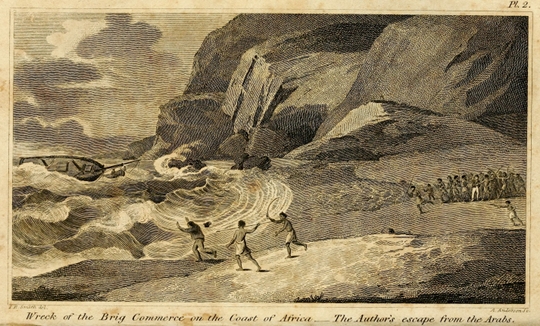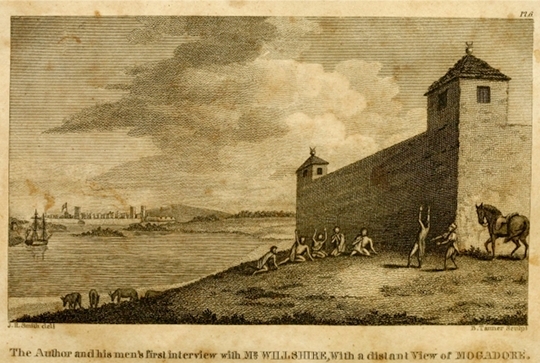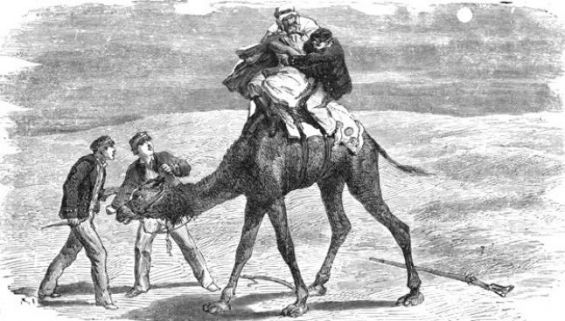Living in Mogador in the 19th century, William Willshire was a distinguished Englishman who was notorious for redeeming Western sailors enslaved in Morocco. The Londoner deputed his diplomatic career in the Alaouite Kingdom after he was sent by English trading house James Renshaw and Co to Mogador in 1814.
In the coastal city, Willshire worked as an agent for the British firm but quickly took a more important position. In Morocco, the Englishman became British vice consul in Mogador after he was recommended by his predecessor Joseph Dupuis.

In addition to his diplomatic missions, William Willshire gained fame for his fine personal qualities. He was a man who hated slavery and worked on granting liberty to Christians captured and enslaved in the Kingdom.
Saving captain James Riley
His account made it to history books, thanks to two famous men he redeemed. James Riley was one of them. The latter is the Captain of the United States merchant ship Commerce who was captured after he was shipwrecked alongside his crew.
The story of Captain James Riley and Willshire survived as it was thoroughly narrated in his book entitled «Sufferings in Africa: The Incredible True Story of a Shipwreck, Enslavement, and Survival on the Sahara» (Skyhorse Publishing Inc., 2007).
Listed by President Abraham Lincoln as one of the books that most influenced his life, Riley’s memoire recalls his sufferings in Morocco in the hands of his Moor enslavers. However, the book pays close attention to the kindness of Willshire, the man who ended Riley’s ordeal.
«I cannot here omit mentioning the manner in which Mr. Willshire got my first note», wrote Captain Riley, who with the help of a Moor called Sidi Hamet managed to send a rescue letter to Willshire to be redeemed.
Riley who suffered from forced labor alongside his crew, was happy to write about the help provided by Willshire. «Sidi Hamet (the bearer of the letter) … came to the gate of Swearah or Mogador, he providentially was met by Rais ben Cossim, who was the only one which Mr. Willshire placed confidence in, or treated as a friend», recalled the American captain.

Once in Mogador, Sidi Hamet was received by Willshire to whom he handed Riley’s letter. The British vice consul «offered to restore [Riley] and [his] men to liberty». The rescue account was the start of a long-lasting friendship between the English vice consul and the American captain.
Historical accounts suggest that the two men became close friends and business partners. Riley had even named his son after William Willshire while the latter decided to settle down in the US and buy a house there to join his old friend after retiring.
Although Willshire’s American dream did not come true, Captain Riley and after returning to the US named a town he founded in Ohio after his British friend, William Willshire.
The ordeal of captain Alexander Scott
But the account of captain James Riley was not the only one that rendered homage to William Willshire. According to a book entitled «New voyages and travels: originals and translations» (1823) by sir R. Phillips, Willshire helped redeem Captain Alexander Scott, an enslaved Westerner who was captured for six years in Morocco.
Just like Riley, Captain Scott wrote to Willshire in an attempt to be freed. His letter was delivered by a man who «left him under the care of his brother and son», the same source wrote.

«He set off with the letter, and after an absence of eight days [he] returned with a letter from William Willshire, the English consul at Mogador, who sent a horse for Scott to ride upon, and 27 dollars to buy provisions».
In an account that was published for The New Monthly Magazine and Literary Journal in 1821, the «writer of Scott’s narrative pays a very pretty compliment and a very just acknowledgement to Mr. Willshire, for the fidelity with which he discharged the agreeable office of redeeming Christians from slavery».
The same book recalls that at Mogador, Scott «received every kind attention from Mr. Willshire, who paid his ransom to the Moor, on account of Ironmongers’ company of London». According to the same source, Scott reached Mogador on August the 31st and left for London on November the 11th.
In addition to his efforts to redeem Christian slaves in Morocco, Willshire was assigned with looking into the case of Jewish merchant and ambassador Meir Macnin, who went bankrupted after operating for years in Essaouira and London.
This mission was reported by Daniel J. Schroeter in his book «The Sultan's Jew: Morocco and the Sephardi World», writing that Willshire «reports in his diary that there was no hope of any part of Macnin’s property being recovered for benefit of the creditors», who were mainly British.
In 1844, Willshire’s career in Mogador came to an end after he left for England. He was forced to leave Morocco after the French bombarded Mogador and his property was lost. Willshire died seven years later in Adrianople, a Turkish city where he served as a consul.




 chargement...
chargement...












